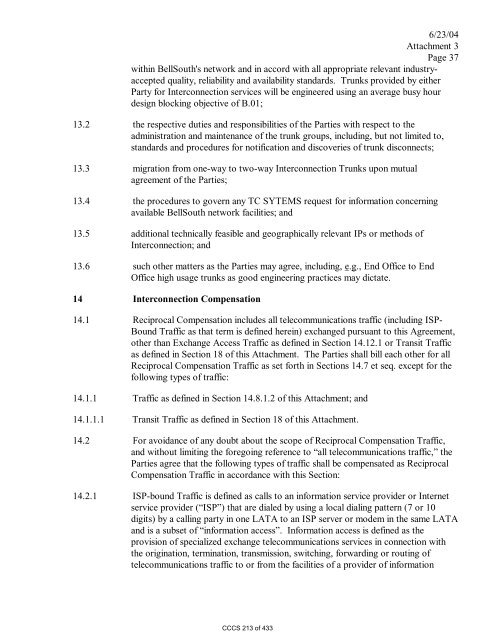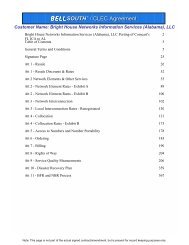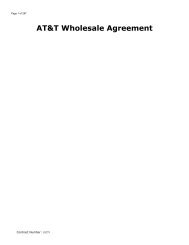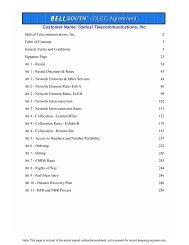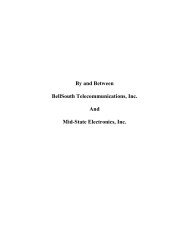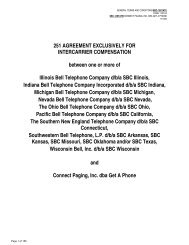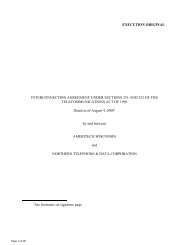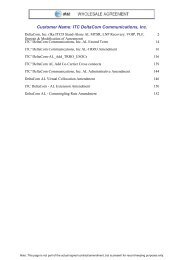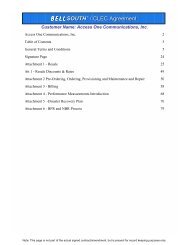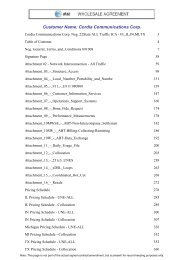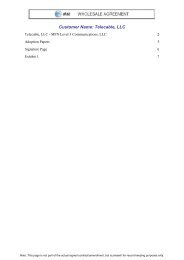- Page 1 and 2:
TC Systems, Inc. South Carolina Gen
- Page 3 and 4:
AGREEMENT between BellSouth Telecom
- Page 5 and 6:
Agreement Page 3 18. Confidentialit
- Page 7 and 8:
1. Provision of Local Service and U
- Page 9 and 10:
Agreement Page 7 Services and Eleme
- Page 11 and 12:
8. Responsibility For Environmental
- Page 13 and 14:
Agreement Page 11 regulatory approv
- Page 15 and 16:
Agreement Page 13 INTENTIONAL MISCO
- Page 17 and 18:
Agreement Page 15 (collectively, th
- Page 19 and 20:
Agreement Page 17 11.5.1 For purpos
- Page 21 and 22:
Agreement Page 19 percent (4%) of t
- Page 23 and 24:
Agreement Page 21 gross receipts or
- Page 25 and 26:
Agreement Page 23 to whether to con
- Page 27 and 28:
Agreement Page 25 delivered persona
- Page 29 and 30:
Agreement Page 27 18.5 The Recipien
- Page 31 and 32:
Agreement Page 29 basic Directory L
- Page 33 and 34:
Agreement Page 31 states applicable
- Page 35 and 36:
Agreement Page 33 21.10 Failure to
- Page 37 and 38:
Agreement Page 35 24.5.1 Except as
- Page 39 and 40:
Agreement Page 37 construed in acco
- Page 41 and 42:
CCCS 41 of 433
- Page 43 and 44:
CONTENTS Agreement Exhibit A Page 2
- Page 45 and 46:
Agreement Exhibit A Page 4 availabl
- Page 47 and 48:
Agreement Exhibit A Page 6 during o
- Page 49 and 50:
g) Begin restoring service to CLECs
- Page 51 and 52:
Hurricane Information Agreement Exh
- Page 53 and 54:
Version 2Q03: 07/21/03 Table of Con
- Page 55 and 56:
3. General Provisions Version 2Q03:
- Page 57 and 58:
Attachment 1 Page 6 3.14.1 TC SYSTE
- Page 59 and 60:
Version 2Q03: 07/21/03 Attachment 1
- Page 61 and 62:
Version 2Q03: 07/21/03 Attachment 1
- Page 63 and 64:
7.4 Branding for Operator Call Proc
- Page 65 and 66:
Attachment 1 Page 14 7.4.5.7 The ra
- Page 67 and 68:
Version 2Q03: 07/21/03 EXCLUSIONS A
- Page 69 and 70:
Version 2Q03: 07/21/03 Attachment 1
- Page 71 and 72:
4. GetData Version 2Q03: 07/21/03 A
- Page 73 and 74:
Version 2Q03: 07/21/03 CCCS 73 of 4
- Page 75 and 76:
Version 2Q03: 07/21/03 Attachment 1
- Page 77 and 78:
6.6 Testing Version 2Q03: 07/21/03
- Page 79 and 80:
Version 2Q03: 07/21/03 Method of Re
- Page 81 and 82:
RESALE DISCOUNTS & RATES - South Ca
- Page 83 and 84:
Version 3Q03: 11/12/2003 BST 09/29/
- Page 85 and 86:
Version 3Q03: 11/12/2003 BST 09/29/
- Page 87 and 88:
Version 3Q03: 11/12/2003 BST 09/29/
- Page 89 and 90:
Version 3Q03: 11/12/2003 BST 09/29/
- Page 91 and 92:
Version 3Q03: 11/12/2003 BST 09/29/
- Page 93 and 94:
Version 3Q03: 11/12/2003 BST 09/29/
- Page 95 and 96:
Version 3Q03: 11/12/2003 BST 09/29/
- Page 97 and 98:
Version 3Q03: 11/12/2003 BST 09/29/
- Page 99 and 100:
Version 3Q03: 11/12/2003 BST 09/29/
- Page 101 and 102:
Version 3Q03: 11/12/2003 BST 09/29/
- Page 103 and 104:
2.1.10.2.3 Firm Order Commitment (
- Page 105 and 106:
Version 3Q03: 11/12/2003 BST 09/29/
- Page 107 and 108:
Version 3Q03: 11/12/2003 BST 09/29/
- Page 109 and 110:
Version 3Q03: 11/12/2003 BST 09/29/
- Page 111 and 112:
Version 3Q03: 11/12/2003 BST 09/29/
- Page 113 and 114:
Version 3Q03: 11/12/2003 BST 09/29/
- Page 115 and 116:
Version 3Q03: 11/12/2003 BST 09/29/
- Page 117 and 118:
Version 3Q03: 11/12/2003 BST 09/29/
- Page 119 and 120:
Version 3Q03: 11/12/2003 BST 09/29/
- Page 121 and 122:
Version 3Q03: 11/12/2003 BST 09/29/
- Page 123 and 124:
Version 3Q03: 11/12/2003 BST 09/29/
- Page 125 and 126:
Version 3Q03: 11/12/2003 BST 09/29/
- Page 127 and 128:
Version 3Q03: 11/12/2003 BST 09/29/
- Page 129 and 130:
Version 3Q03: 11/12/2003 BST 09/29/
- Page 131 and 132:
Version 3Q03: 11/12/2003 BST 09/29/
- Page 133 and 134:
3.8 Maintenance - Line Splitting Ve
- Page 135 and 136:
Version 3Q03: 11/12/2003 BST 09/29/
- Page 137 and 138:
Version 3Q03: 11/12/2003 BST 09/29/
- Page 139 and 140:
Version 3Q03: 11/12/2003 BST 09/29/
- Page 141 and 142:
Version 3Q03: 11/12/2003 BST 09/29/
- Page 143 and 144:
Version 3Q03: 11/12/2003 BST 09/29/
- Page 145 and 146:
Version 3Q03: 11/12/2003 BST 09/29/
- Page 147 and 148:
Version 3Q03: 11/12/2003 BST 09/29/
- Page 149 and 150:
Version 3Q03: 11/12/2003 BST 09/29/
- Page 151 and 152:
Version 3Q03: 11/12/2003 BST 09/29/
- Page 153 and 154:
Version 3Q03: 11/12/2003 BST 09/29/
- Page 155 and 156:
Version 3Q03: 11/12/2003 BST 09/29/
- Page 157 and 158:
Version 3Q03: 11/12/2003 BST 09/29/
- Page 159 and 160:
UNBUNDLED NETWORK ELEMENTS - South
- Page 161 and 162: UNBUNDLED NETWORK ELEMENTS - South
- Page 163 and 164: UNBUNDLED NETWORK ELEMENTS - South
- Page 165 and 166: UNBUNDLED NETWORK ELEMENTS - South
- Page 167 and 168: UNBUNDLED NETWORK ELEMENTS - South
- Page 169 and 170: UNBUNDLED NETWORK ELEMENTS - South
- Page 171 and 172: UNBUNDLED NETWORK ELEMENTS - South
- Page 173 and 174: UNBUNDLED NETWORK ELEMENTS - South
- Page 175 and 176: UNBUNDLED NETWORK ELEMENTS - South
- Page 177 and 178: ATTACHMENT 3 LOCAL INTERCONNECTION
- Page 179 and 180: LOCAL INTERCONNECTION 1 NETWORK INT
- Page 181 and 182: 6/23/04 Attachment 3 Page 5 mutual
- Page 183 and 184: 6/23/04 Attachment 3 Page 7 1.9 For
- Page 185 and 186: 6/23/04 Attachment 3 Page 9 2.1.4.2
- Page 187 and 188: Baton Rouge, LA LA0050 BTRGLAMA 333
- Page 189 and 190: 6/23/04 Attachment 3 Page 13 Meet f
- Page 191 and 192: 6/23/04 Attachment 3 Page 15 3.1.3
- Page 193 and 194: 6/23/04 Attachment 3 Page 17 3.7 Fo
- Page 195 and 196: 6/23/04 Attachment 3 Page 19 3.18.1
- Page 197 and 198: 6/23/04 Attachment 3 Page 21 3.22.3
- Page 199 and 200: 4.4.2.3 Interface Requirements 6/23
- Page 201 and 202: 6/23/04 Attachment 3 Page 25 4.4.8
- Page 203 and 204: 6/23/04 Attachment 3 Page 27 system
- Page 205 and 206: 7.11 Interface Requirements 7.11.1
- Page 207 and 208: 6/23/04 Attachment 3 Page 31 7.18 T
- Page 209 and 210: 6/23/04 Attachment 3 Page 33 8.9 Be
- Page 211: 11 NETWORK MAINTENANCE 6/23/04 Atta
- Page 215 and 216: 6/23/04 Attachment 3 Page 39 14.5.3
- Page 217 and 218: 6/23/04 Attachment 3 Page 41 the cu
- Page 219 and 220: 6/23/04 Attachment 3 Page 43 such i
- Page 221 and 222: 6/23/04 Attachment 3 Page 45 perspe
- Page 223 and 224: 6/23/04 Attachment 3 Page 47 19.3.1
- Page 225 and 226: LOCAL INTERCONNECTION - South Carol
- Page 227 and 228: Version 2Q03: 07/21/03-TC SYSTEMS A
- Page 229 and 230: Version 2Q03: 07/21/03-TC SYSTEMS A
- Page 231 and 232: Version 2Q03: 07/21/03-TC SYSTEMS A
- Page 233 and 234: Version 2Q03: 07/21/03-TC SYSTEMS A
- Page 235 and 236: Version 2Q03: 07/21/03-TC SYSTEMS A
- Page 237 and 238: Version 2Q03: 07/21/03-TC SYSTEMS A
- Page 239 and 240: Version 2Q03: 07/21/03-TC SYSTEMS A
- Page 241 and 242: Version 2Q03: 07/21/03-TC SYSTEMS A
- Page 243 and 244: Version 2Q03: 07/21/03-TC SYSTEMS A
- Page 245 and 246: Version 2Q03: 07/21/03-TC SYSTEMS A
- Page 247 and 248: Version 2Q03: 07/21/03-TC SYSTEMS A
- Page 249 and 250: Version 2Q03: 07/21/03-TC SYSTEMS A
- Page 251 and 252: Version 2Q03: 07/21/03-TC SYSTEMS A
- Page 253 and 254: Version 2Q03: 07/21/03-TC SYSTEMS A
- Page 255 and 256: Version 2Q03: 07/21/03-TC SYSTEMS A
- Page 257 and 258: Version 2Q03: 07/21/03-TC SYSTEMS A
- Page 259 and 260: Version 2Q03: 07/21/03-TC SYSTEMS A
- Page 261 and 262: Version 2Q03: 07/21/03-TC SYSTEMS A
- Page 263 and 264:
Version 2Q03: 07/21/03-TC SYSTEMS A
- Page 265 and 266:
Version 2Q03: 07/21/03-TC SYSTEMS A
- Page 267 and 268:
Version 2Q03: 07/21/03-TC SYSTEMS A
- Page 269 and 270:
capabilities for its materials used
- Page 271 and 272:
Janitorial services Version 2Q03: 0
- Page 273 and 274:
Version 2Q03: 07/21/03 Attachment 4
- Page 275 and 276:
Version 2Q03: 07/21/03 Attachment 4
- Page 277 and 278:
3. Collocation Options Version 2Q03
- Page 279 and 280:
Version 2Q03: 07/21/03 Attachment 4
- Page 281 and 282:
Version 2Q03: 07/21/03 Attachment 4
- Page 283 and 284:
5. Use of Remote Collocation Space
- Page 285 and 286:
Version 2Q03: 07/21/03 Attachment 4
- Page 287 and 288:
Version 2Q03: 07/21/03 Attachment 4
- Page 289 and 290:
Version 2Q03: 07/21/03 Attachment 4
- Page 291 and 292:
Version 2Q03: 07/21/03 Attachment 4
- Page 293 and 294:
Version 2Q03: 07/21/03 Attachment 4
- Page 295 and 296:
Version 2Q03: 07/21/03 Attachment 4
- Page 297 and 298:
Version 2Q03: 07/21/03 Attachment 4
- Page 299 and 300:
Version 2Q03: 07/21/03 Attachment 4
- Page 301 and 302:
Version 2Q03: 07/21/03 ENVIRONMENTA
- Page 303 and 304:
materials) Pollution liability insu
- Page 305 and 306:
4. ACRONYMS BST - BellSouth Telecom
- Page 307 and 308:
COLLOCATION - South Carolina Attach
- Page 309 and 310:
COLLOCATION - South Carolina Attach
- Page 311 and 312:
Attachment 5 Access to Numbers and
- Page 313 and 314:
ACCESS TO NUMBERS AND NUMBER PORTAB
- Page 315 and 316:
Attachment 5 Page 5 to overtime bil
- Page 317 and 318:
ATTACHMENT 6 ACCESS TO OPERATIONS S
- Page 319 and 320:
ACCESS TO OPERATIONS SUPPORT SYSTEM
- Page 321 and 322:
Attachment 6 Page 5 whether to cont
- Page 323 and 324:
Attachment 6 Page 7 SYSTEMS’s abi
- Page 325 and 326:
Attachment 6 Page 9 3.14 Requests f
- Page 327 and 328:
Attachment 6 Page 11 4.3 For servic
- Page 329 and 330:
ATTACHMENT 7 CONNECTIVITY BILLING A
- Page 331 and 332:
Attachment 7 Page 4 Association (NE
- Page 333 and 334:
Attachment 7 Page 6 except for deta
- Page 335 and 336:
Attachment 7 Page 8 Party, charges
- Page 337 and 338:
Attachment 7 Page 10 requests an ad
- Page 339 and 340:
Attachment 7 Page 12 (except a magn
- Page 341 and 342:
Attachment 7 Page 14 Luther King, J
- Page 343 and 344:
Attachment 7 Page 16 Service Tariff
- Page 345 and 346:
Attachment 7 Page 18 1.16.1 Where B
- Page 347 and 348:
ATTACHMENT 8 Attachment 8 Page 1 RI
- Page 349 and 350:
Attachment 8 Page 3 RIGHTS OF WAY (
- Page 351 and 352:
Attachment 8 Page 5 1.17 Licensee.
- Page 353 and 354:
Attachment 8 Page 7 2. SCOPE OF AGR
- Page 355 and 356:
Attachment 8 Page 9 attached or pla
- Page 357 and 358:
Attachment 8 Page 11 3.1.1 The Blue
- Page 359 and 360:
Attachment 8 Page 13 Section 5.1. H
- Page 361 and 362:
Attachment 8 Page 15 3.7.3 Licensee
- Page 363 and 364:
Attachment 8 Page 17 drainage syste
- Page 365 and 366:
Attachment 8 Page 19 5.2 Provision
- Page 367 and 368:
Attachment 8 Page 21 5.6 Where the
- Page 369 and 370:
Attachment 8 Page 23 • In connect
- Page 371 and 372:
To Licensee as follows: Contact Bil
- Page 373 and 374:
Attachment 8 Page 27 its poles or i
- Page 375 and 376:
Attachment 8 Page 29 performed, tha
- Page 377 and 378:
Attachment 8 Page 31 12.2.2 Results
- Page 379 and 380:
Attachment 8 Page 33 16. NOTICE OF
- Page 381 and 382:
Attachment 8 Page 35 18.1 Pole Atta
- Page 383 and 384:
Attachment 8 Page 37 assign this At
- Page 385 and 386:
2006 FCC Formula Supported Fees for
- Page 387 and 388:
Records Maintenance Centers Attachm
- Page 389 and 390:
Version 3Q03: 12/10/2003 SERVICE QU
- Page 391 and 392:
BONA FIDE REQUEST AND NEW BUSINESS
- Page 393 and 394:
Version 2Q03: 07/21/03 Attachment 1
- Page 395 and 396:
Version 2Q03: 07/21/03 Attachment 1
- Page 397 and 398:
ATTACHMENT 11 NETWORK SECURITY CCCS
- Page 399 and 400:
ATTACHMENT 12 ACRONYMS CCCS 399 of
- Page 401 and 402:
Attachment 12 Page 3 CATS Calling C
- Page 403 and 404:
ESF Extended Super Frame ESIT Excha
- Page 405 and 406:
NECA National Exchange Carrier Asso
- Page 407 and 408:
SS7 Signaling System 7 SSP Switchin
- Page 409 and 410:
Version: Rearrangements Amendment 1
- Page 411 and 412:
UNBUNDLED NETWORK ELEMENTS - South
- Page 413 and 414:
CCCS 413 of 433 [CCCS Amendment 2 o
- Page 415 and 416:
AT&T to process. Attachment 3 Exhib
- Page 417 and 418:
Attachment 3 Exhibit B Page 4 of 7
- Page 419 and 420:
Attachment 3 Exhibit B Page 6 of 7
- Page 421 and 422:
BST EO 1 - way local/intraLATA toll
- Page 423 and 424:
BST EO 2 - way local/intraLATA toll
- Page 425 and 426:
Third Amendment to the Agreement Be
- Page 427 and 428:
FOURTH AMENDMENT TO THE AGREEMENT B
- Page 429 and 430:
TC Systems-SC Amendment to the Agre
- Page 431 and 432:
TC Systems - SC Amendment to the Ag
- Page 433:
CCCS 433 of 433 [CCCS Amendment 3 o


